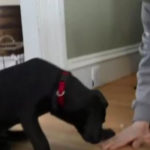We probably know somebody who cracks their joints regularly or we may do it ourselves. If that’s the case, you might want to rethink what you are doing when you hear about this 23-year-old paramedic. She regularly cracks her joints but when she cracked her neck, it ruptured a major artery in her spine and caused a stroke.
Natalie Kunicki is a paramedic for the London Ambulance Service (LAS). She was resting in bed on the night of March 4 with a friend when she stretched her neck and heard a loud crack.
She didn’t think anything about it and went to sleep but 15 minutes later, she woke up and couldn’t move her left leg. She tried to walk but fell to the floor.
Natalie was rushed to the hospital in the early morning hours of March 5. A CT scan confirmed that she had indeed suffered a stroke.
When Natalie cracked her neck, she also cracked her vertebral artery. That is a major artery in the neck. After it burst, it caused a blood clot to form in the brain and a stroke occurred.

Natalie was able to regain most of the movement in her arm, hand and leg with a daily exercise regime. After being discharged from the hospital, she went to her parent’s home. That happened on 28 March.
She is now warning people of the dangers of cracking joints. She also wants to make them aware that a stroke could occur at any age.
Natalie had the following to say: “People need to know that even if you’re young, something this simple can cause a stroke. I wasn’t even trying to crack my neck. I just moved and it happened.
“I’m a paramedic and I didn’t ring 999 for 10 minutes because I thought it was too unlikely it would be a stroke when I should have known much better. Every minute more of your brain cells are dying, so don’t ever discount a stroke just because someone is young.

“people need to be more mindful when doing any chiropractic exercises or strenuous gym weights. I was in bed watching stuff with a friend when it happened.
“I stretched my neck and I could just hear this ‘crack, crack, crack’. My friend asked ‘was that your neck?’ but all my joints crack quite a bit so I didn’t think anything of it. I just laughed.
“I fell asleep and when I woke up about 15 minutes later. I wanted to go to the bathroom but I could feel this leg in the bed and I was asking my friend if he could move his leg.
“He told me it was my leg but I was a bit tipsy so I wasn’t taking anything seriously and just thought ‘that’s a bit weird’. I got up and tried to walk to the bathroom and I was swaying everywhere. I looked down and realised I wasn’t moving my left leg at all – then I fell to the floor.”

Natalie was surprised when she found out that she had suffered from a stroke. “When the consultant told me I’d had a stroke I was in shock.
“The doctors told me later that just that stretching of my neck had caused my vertebral artery to rupture. It was just spontaneous and there’s a one in a million chance of it happening.
“I don’t smoke, I don’t really drink, I don’t have any family history of strokes so it’s quite strange it happened to me when I was just moving in bed.
“I was in shock for about three days in ICU. I was a bit of a wet blanket. I didn’t really say much and I wasn’t engaging with anyone. I had no sense of humour.
“I was just completely shut off, trying to compute what had happened. People said I was a bit like a robot and didn’t show much emotion.

“But a couple of my friends from the ambulance service told me, ‘You have a week from the day of your stroke to snap out of this or we will snap you out of it.’
“I was able to have my little pity party for a week but that’s it. They told me, ‘What’s done is done now – just work and do all the exercises.’
“They were fantastic and they would come in and do all the exercises with me. I think if I didn’t have them I would have been in my pity party quite a bit longer but instead I smashed through all the therapy goals.
“I just love my job and I want to get back to it. I’m so used to being busy and now I feel like I’m climbing the walls a bit. I definitely want to get back to work as soon as I can.”

Natalie continued: “I was trying to call 999 but I was dithering about it. There was a high chance the crew who turned up would be my friends and I didn’t want them to see me tipsy. I tried to go back to sleep but I couldn’t, so I called 999 and I didn’t recognise the crew who turned up.
“I think they did look at me at first like they thought I was just a classic drunk 23-year-old but I told them I was a paramedic and I knew something was wrong.
“They took my blood pressure and heart rate and they were both sky high. Then they did this test where they hold their finger in the air and you have to touch your nose then their finger. My hand went all over the place and I was thinking ‘oh no’. I knew something was going down.”
She was rushed by ambulance to the University College London Hospital. Tests were given that confirmed she had suffered a stroke and needed emergency surgery.

She was then blue-lighted to the National Hospital for Neurology and Neurosurgery. Doctors discovered the burst artery during a three-hour surgery.
A stent was used to repair the artery but the clot could not be cleared from the brain. They think that it will dissolve as time goes by.
Natalie said: “I expected to wake up from this miracle surgery and everything would be fixed but my mobility was worse and they couldn’t clear the clot. At the start I couldn’t move my thumb and forefinger. I could kind of move my wrist up and down. I couldn’t lift my arm. I could bend my left leg but I couldn’t wiggle my toes.
“The doctors would do tests – I had to close my eyes and they would touch my left side but I couldn’t tell where they were touching. It was like when you have really bad sunburn and your skin is sizzling. I felt that all down my left side.
“I think I scared my consultant because after I woke up, she came in to ask how I was going – but I told her, ‘You should have killed me.’ Depression is really common after a stroke because you lose so much of your independence and your dignity.

“I had to have a nurse help me shower in a wheelchair. What 23-year-old needs someone to help them shower and wash their hair? It was just a bit surreal.”
Natalie has now recovered some sensation and movement. She says she is feeling much better and feels the stay at her parents home has helped to speed up the recovery.
An exact timetable could not be given until she is fully recovered but she is hoping to be back to ‘light-duty’ within a year.
Natalie said: “I was scared at first about being discharged, because my parents’ home has lots of stairs and I didn’t know how I was going to manage, but it’s gone well. I’ve recovered movement in my left side. I can walk but not for more than five minutes. I’m really clumsy. I can’t do up buttons, I find it too difficult. I can feel hot and cold now but I still feel a bit numb.
“Being discharged and at my parents’ is definitely helping with my recovery because I had to do things for myself. I have to get dressed, make the bed and I can go to make a cup of tea. I’m definitely doing something right but it’s slow going.
“It has been strange being on the other side but the ambulance crew who came out to me were amazing. They did a perfect job. They even stayed with me to hold my hand while I waited for my parents and blue-lighted me to the other hospital for my surgery, even though their shift had ended.”
Along with her desire to get back to work, she also has a desire to teach others about the dangers of stroke.
Natalie said: “I have been called out to so many people having strokes and they’re always in their 70s or 80s. I have never been to a young person having a stroke. Mine was one in a million but a ruptured vertebral artery is actually quite a common cause of strokes in young people.
“They will be in the gym or doing something quite physical and it happens. Strokes are also quite common in kids. It was a shock for me. I thought as a professional I would have an idea but even I didn’t know. Normally if you’re called out to a young person, you wouldn’t do a test for a stroke.”
Natalie is living with her parents, Peter, 65 and 80, 62. She hopes to get back to Australia in July. A fundraising page was set up by her brother, Michael to help with her expenses during this time.
Natalie said: “When I woke up from surgery my brother told me he’d set up a fundraising page and all my friends and colleagues have been sharing it. Eighty percent of the donations are from people I work with which means so much. It’s going to be so helpful.
“I really want to get back in my own flat and I really don’t want to have to move back to Australia. I love my work too much and I don’t want to leave them.”
To donate to Natalie’s gofundme page, click here.






